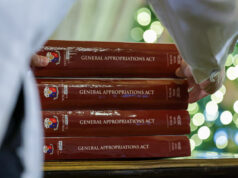Rice tariff bill hurdles House on second reading
THE House of Representatives, voting viva voce, passed on second reading the rice tariff bill, which hopes to broaden rice imports and use the tariffs to fund measures to improve competitiveness in the rice industry.
House Bill 7735, the Revised Agricultural Tariffication Act, proposes the creation the Rice Competitiveness Enhancement Fund (RCEF) as the government expands the role of private traders in importing rice.
The fund will help support upgrades to farming equipment and provide financing for crop loans and insurance, among others.
The fund will also be used for post-harvest, logistical projects and rice marketing, rice scholarships and vocational education and research extension services.
Albay Representative Edcel C. Lagman, prior to voting, moved to introduce a provision to automatically appropriate funds for RCEF.
“The proceeds from the rice fund shall automatically be appropriated and periodically released by the DBM (Department of Budget and Management) to the DA (Department of Agriculture) in order to sustain the program on rice sufficiency and enhance the small farmers self-reliance,” Mr. Lagman said. The proposal was accepted by bill sponsor Representative Jose T. Panganiban.
The measure also proposes to restore the minimum access volume (MAV) on rice to its 2012 level of 350,000 metric tons (MT).
It also proposed that the bound rate for rice imported from non-ASEAN World Trade Organization members be set at the 40% Most Favored Nation (MFN) rate within the 350,000 MT MAV. Beyond the quota, the rate rises to 180% for MFNs.
Imports from ASEAN will follow import duty rates set out by the ASEAN Trade in Goods Agreement.
The measure will also allow the President to make adjustments in the applied rate, or regulate rice exports as well as imports, and enter into trade negotiations, relating to bound or maximum rates on rice trade. The president, however, can intervene for not more than two months.
The “Revised Agricultural Tariffication Act,” is among the priority bills listed by the Legislative-Executive Development Advisory Council.
Its counterpart measure, Senate Bill 1839, authored by Senator Sherwin T. Gatchalian, remains pending at the committee level. — Charmaine A. Tadalan



